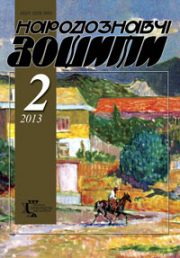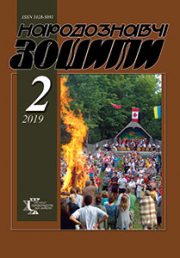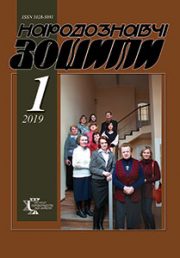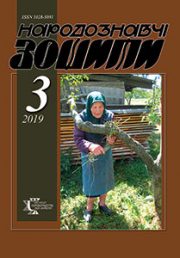The Ethnology Notebooks. 2022. № 1 (163), 218—225
UDK [7.079:392.81:664.6](=161.2):316.7
DOI https://doi.org/10.15407/nz2022.01.218
CULTURAL AND ARTISTIC SPACE OF «HOLIDAY OF BREAD» FESTIVAL: CONCEPT, FUNCTIONS
HERUS Lyudmyla
- ORCID ID: https://orcid.org/0000-0002-5931-3816
- Doctor of Sciences in History, Senior Researcher
- of the Institute of Ethnology of the National Academy
- of Sciences of Ukraine,
- in the Department of Folk Art,
- 15, Svobody Avenue, 79000, Lviv, Ukraine,
- Contacts: e-mail: ludmilagerus@gmail.com
Abstract. Introduction. In the early XXI century festivals of ethnographic direction have become not only a festive event, but also a powerful social phenomenon, a kind of multifaceted and multifunctional means of cultural communication.
Article purpose — to clarify the concept of the «Holiday of Bread» festival, to analyze the program and activities and find out its importance for the preservation and promotion of baking traditions of Ukrainians in the modern sociocultural space.
The object of research is the cultural and artistic space of «Holiday of Bread», and the subject is its entertainment and leisure practices of «Holiday of Bread» festival.
The article source base is author`s directly involved and observation on the organization and course of events «Holiday of Bread», exhibitions of ritual bread, as well as announcements, reviews of «Holiday of Bread» on Internet sites.
Observation and photo-fixation methods were used to gather information. The method of systematic analysis of cultural phenomena was used to establish structural relationships of ritual bread as a system of properties and relations of the cultural continuum, which is based on the interdependence and interdependence of factors, phenomena, events, etc.
Conclusion. In Ukraine, the «Holiday of Bread» festival was formed into a bright major sociocultural entertainment and leisure event, which creates an aesthetic reality that makes baking traditions more accessible to a wide audience and contributes to the preservation, revival of unique cultural heritage through the latest cultural achievements` production, management, etc. its integration into modernity. It is established that the «Holiday of Bread» festival is a special type of cultural and artistic space, where traditional and experimental forms of modern creative practice interact. The «Holiday of Bread» festival is an opportunity to fully present tangible and intangible objects, acquainting them with different segments of society, including tourists, provides an exchange of experiences between professionals, thanks to a meaningful program, coverage of numerous of participants and events. It is found out that the «Holiday of Bread» festival is an important social action that promotes the revival and preservation of unique cultural heritage, the harmony of diverse ethnic relations with the world, the formation of a values` system. It also ensures continuity between the past, present and the future. At the same time, the «Holiday of Bread» festival as an important sociocultural event is an effective resource for promoting the historical and cultural opportunities of Ukraine.
Keywords: ritual bread, korovai, tradition, creative practice, cultural and artistic space, festival, «Holiday of Bread».
Received 11.02.2022
REFERENCES
- Herus, L. (2020). Preservationofthe intangible cultural heritage: ukrainian experience. The Ethnology notebooks,, 1 (151), 3—14. Retrieved from: https://nz.lviv.ua/archiv/2020-1/3.pdf DOI https://doi.org/10.15407/nz2020.01.003 [in Ukrainian].
- Herus, L. (2013). Ritual bread as an artistic artifact. Art History’13: Science. zb. (Pp. 29—38). Retrieved from: https:// issuu.com/858752/docs/mystectvoznavstvo-13 [in Ukrainian].
- Convention for the Safeguarding of the Intangible Cultural Heritage. Retrieved from: https://zakon.rada.gov.ua/laws/show/995_d69 (Last accessed: 21.01.2022).
- Chernetska, S.Yu. (2011). Folklore festivals in the system of modern means of dissemination of ethnographic information and popularization of cultural and artistic heritage. Culture of Ukraine. (Issue 35, pp. 155—164). Kharkiv [in Ukrainian].
- Yakovlev, O.V. (2018). Festival movement as an integration factor and preserve the national cultural landscape. Bulletin of the National Academy of Management of Culture and Arts, 4, 56—60 [in Ukrainian].







